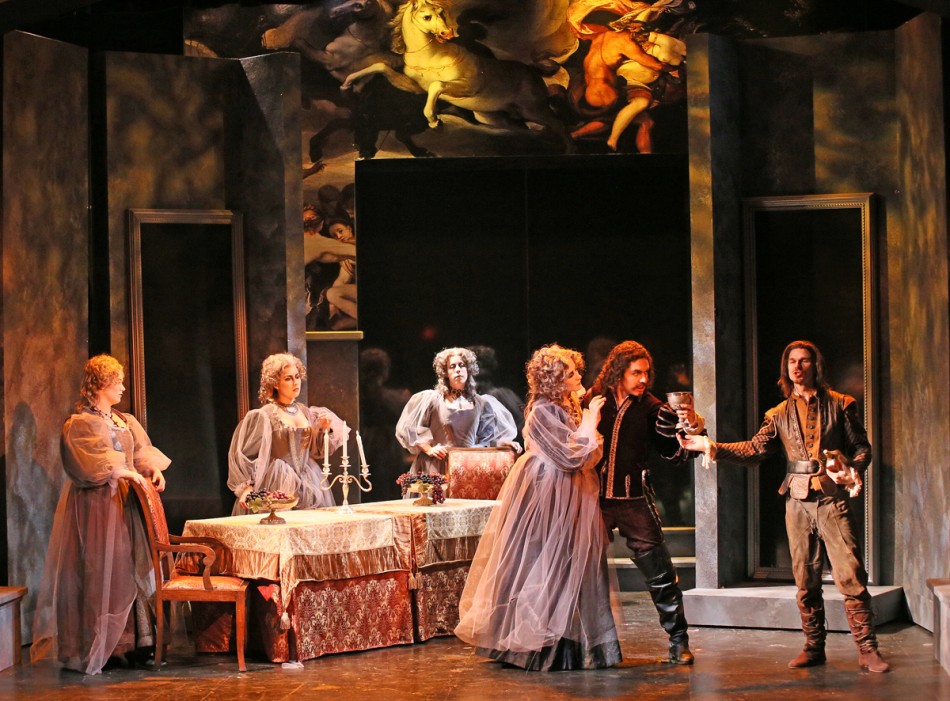
Because the Academy of Vocal Arts is a teaching institution, its choice of repertoire is focused on what will provide the best opportunities for its resident artists. That explains why Don Giovanni frequently appears on its performing schedule, and why it was this season’s opener.
Mozart’s masterpiece gives prominence for eight singers to display their talents in a work that’s regularly performed around the world. Thus the students can hone their skills in parts that will provide numerous job opportunities.
Almost as a byproduct, Don Giovanni also is an opera that pleases audiences. Theater and music lovers are drawn to the drama of a libertine who defies society’s rules and almost gets away with it. The opening night patrons at AVA saw a superb performance that rivaled the Don Giovannis of major opera houses.
This was a propulsive, riveting interpretation. Conductor Christofer Macatsoris maintained tension as Giovanni went from one outrageous adventure to another, and he made sure that the singers didn’t slow the pace by adding self-serving ritards or embellishments that are not in the score. The singers observed the long phrases that Mozart wrote, and molded them with expression, instead of breaking them with extra breaths for their convenience.
Performances of Don Giovanni at Glyndebourne England in the 1930s are legendary for their ensemble excellence. I’ve heard them on records, and for unity of approach and adherence to Mozartean style, this by AVA was at least as good. Macatsoris cultivated a tight bond between singers and an orchestra that sounded loving and emotional. This was not a hard-driven rendition such as, say, the 1990 Muti Vienna recording of the opera.
The AVA singers were more consistent in quality than those I saw at La Scala and at the Metropolitan in recent years. Some of their big names sounded edgy or unsteady, while these young artists had better technical command and were truer to Mozart’s instructions.
Don Giovanni’s vocal score is evenly distributed among the cast, seven of whom have their own arias. Vanessa Vasquez’s singing of Donna Annas’s Non mi dir (“Tell me not”) was gorgeous, with power, warmth and shimmering high notes. Jonas Hacker’s Il mio tesoro (“My treasure”) was elegant, with an unusual combination of ringing tone and amazingly-extended phrases, such as the scale passage just before the return of the main melody’s second chorus. In major opera houses this part has sounded anemic, or dry, or choppy compared to Hacker’s lovely rendition.
Anush Avetisyan revealed major talent as Donna Elvira. In Ah, chi mi dice mai (“Who will ever tell me?”) she augmented her soprano voice with rich low tones. Because this production used Mozart’s original Prague score, Elvira’s second aria, Mi tradi, added six months later for Vienna, was omitted. Its inclusion would have slowed the opera’s momentum, but what a wonderful expression it is of the character’s neurosis and hysteria! Yet this Prague version makes a tighter drama.
The peasant Zerlina, sometimes cast as a chirpy high soprano, was Allegra De Vita, a solid mezzo who showed strength of purpose. Jorge Espino as Masetto expressed the determination of a proletarian and André Courville as Leporello humorously listed his boss’s conquests in his Catalog Aria.
Daniel Noyola was a charismatic Giovanni, belting out numerous high D-naturals. It’s a curiosity that Mozart gave his title character only two brief arias—a champagne toast and a serenade—but Noyola made fine impressions in them.
There’ve been other fine AVA productions of this piece in past years. Amazingly, the school keeps attracting top-flight singers to replace those who graduate, and this has the most evenly-matched cast I’ve heard. A parallel cast of AVA residents will alternate during the run’s remaining six performances.
The staging was constricted because of the small size of the room. It should look better when spread out on the wider stages of suburban locations in the next two weeks. Even so, director Jeffrey Marc Buchman provided nice interchanges of balconies and flats to indicate different locales, and he created dramatic images such as Leporello, joining Masetto and his gang in a hunt for Giovanni, coming downstage and looking into the audience’s eyes.
A coup de théâtre was achieved when Giovanni was about to be dragged to hell by the statue. First, the Don faces upstage and moves in that direction to confront his challenger. Then Giovanni wheels around and comes downstage, as if facing us in hell, as a bass voice similar to the statue’s suddenly rings out from the back of the auditorium! This was a Demon, singing “No horror is too dreadful for you.”
Don Giovanni is not a perfect opera. It’s action takes place within a 24-hour period and yet a marble statue of Anna’s father, murdered in the first scene, is chiseled and erected in a cemetery within that brief time. Yet this company’s performance of it achieved musical perfection.
A shorter version of this report was published in The Broad Street Review
Read other reviews in The Cultural Critic